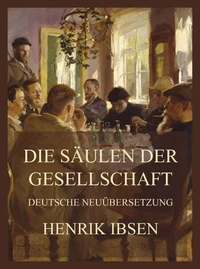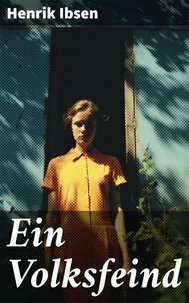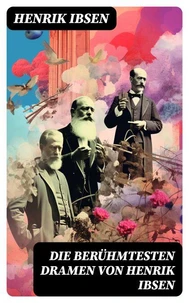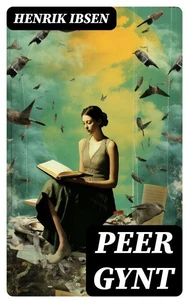John Gabriel Borkman
Par : ,Formats :
Disponible dans votre compte client Decitre ou Furet du Nord dès validation de votre commande. Le format ePub est :
- Compatible avec une lecture sur My Vivlio (smartphone, tablette, ordinateur)
- Compatible avec une lecture sur liseuses Vivlio
- Pour les liseuses autres que Vivlio, vous devez utiliser le logiciel Adobe Digital Edition. Non compatible avec la lecture sur les liseuses Kindle, Remarkable et Sony
 , qui est-ce ?
, qui est-ce ?Notre partenaire de plateforme de lecture numérique où vous retrouverez l'ensemble de vos ebooks gratuitement
Pour en savoir plus sur nos ebooks, consultez notre aide en ligne ici
- Nombre de pages68
- FormatePub
- ISBN859-65--4733793-5
- EAN8596547337935
- Date de parution16/09/2022
- Protection num.Digital Watermarking
- Taille288 Ko
- Infos supplémentairesepub
- ÉditeurDIGICAT
Résumé
Henrik Ibsen's "John Gabriel Borkman" presents a stark exploration of ambition, despair, and the consequences of personal failure. Written in 1896, this late work encapsulates Ibsen's departure from naturalism toward a more symbolic and expressive style. The play revolves around Borkman, a man imprisoned for financial crimes who becomes obsessed with reclaiming his lost ideals and status, reflecting the turbulent socio-economic landscape of late 19th-century Europe.
With its richly layered characters and sharp dialogue, Ibsen critiques the hollowness of societal aspirations while probing the deeply personal realms of guilt and longing. Henrik Ibsen, often hailed as the father of modern drama, was influenced by the political and familial upheavals of his own life, as well as the growing tensions within European society. His experiences in a suffocating society that values material success over individuality are palpable throughout his works.
"John Gabriel Borkman" can be seen as an extension of Ibsen's enduring themes of social criticism and psychological complexity, showcasing his continued evolution as a playwright dedicated to exposing human flaws. This profound play is recommended for readers seeking to understand the intricacies of human ambition and morality. Ibsen's masterful narrative offers not only a vivid character study but also a timeless examination of the lengths to which individuals will go to achieve their dreams, making it essential reading for anyone interested in modernist literature and the evolution of theatrical expression.
With its richly layered characters and sharp dialogue, Ibsen critiques the hollowness of societal aspirations while probing the deeply personal realms of guilt and longing. Henrik Ibsen, often hailed as the father of modern drama, was influenced by the political and familial upheavals of his own life, as well as the growing tensions within European society. His experiences in a suffocating society that values material success over individuality are palpable throughout his works.
"John Gabriel Borkman" can be seen as an extension of Ibsen's enduring themes of social criticism and psychological complexity, showcasing his continued evolution as a playwright dedicated to exposing human flaws. This profound play is recommended for readers seeking to understand the intricacies of human ambition and morality. Ibsen's masterful narrative offers not only a vivid character study but also a timeless examination of the lengths to which individuals will go to achieve their dreams, making it essential reading for anyone interested in modernist literature and the evolution of theatrical expression.
Henrik Ibsen's "John Gabriel Borkman" presents a stark exploration of ambition, despair, and the consequences of personal failure. Written in 1896, this late work encapsulates Ibsen's departure from naturalism toward a more symbolic and expressive style. The play revolves around Borkman, a man imprisoned for financial crimes who becomes obsessed with reclaiming his lost ideals and status, reflecting the turbulent socio-economic landscape of late 19th-century Europe.
With its richly layered characters and sharp dialogue, Ibsen critiques the hollowness of societal aspirations while probing the deeply personal realms of guilt and longing. Henrik Ibsen, often hailed as the father of modern drama, was influenced by the political and familial upheavals of his own life, as well as the growing tensions within European society. His experiences in a suffocating society that values material success over individuality are palpable throughout his works.
"John Gabriel Borkman" can be seen as an extension of Ibsen's enduring themes of social criticism and psychological complexity, showcasing his continued evolution as a playwright dedicated to exposing human flaws. This profound play is recommended for readers seeking to understand the intricacies of human ambition and morality. Ibsen's masterful narrative offers not only a vivid character study but also a timeless examination of the lengths to which individuals will go to achieve their dreams, making it essential reading for anyone interested in modernist literature and the evolution of theatrical expression.
With its richly layered characters and sharp dialogue, Ibsen critiques the hollowness of societal aspirations while probing the deeply personal realms of guilt and longing. Henrik Ibsen, often hailed as the father of modern drama, was influenced by the political and familial upheavals of his own life, as well as the growing tensions within European society. His experiences in a suffocating society that values material success over individuality are palpable throughout his works.
"John Gabriel Borkman" can be seen as an extension of Ibsen's enduring themes of social criticism and psychological complexity, showcasing his continued evolution as a playwright dedicated to exposing human flaws. This profound play is recommended for readers seeking to understand the intricacies of human ambition and morality. Ibsen's masterful narrative offers not only a vivid character study but also a timeless examination of the lengths to which individuals will go to achieve their dreams, making it essential reading for anyone interested in modernist literature and the evolution of theatrical expression.









